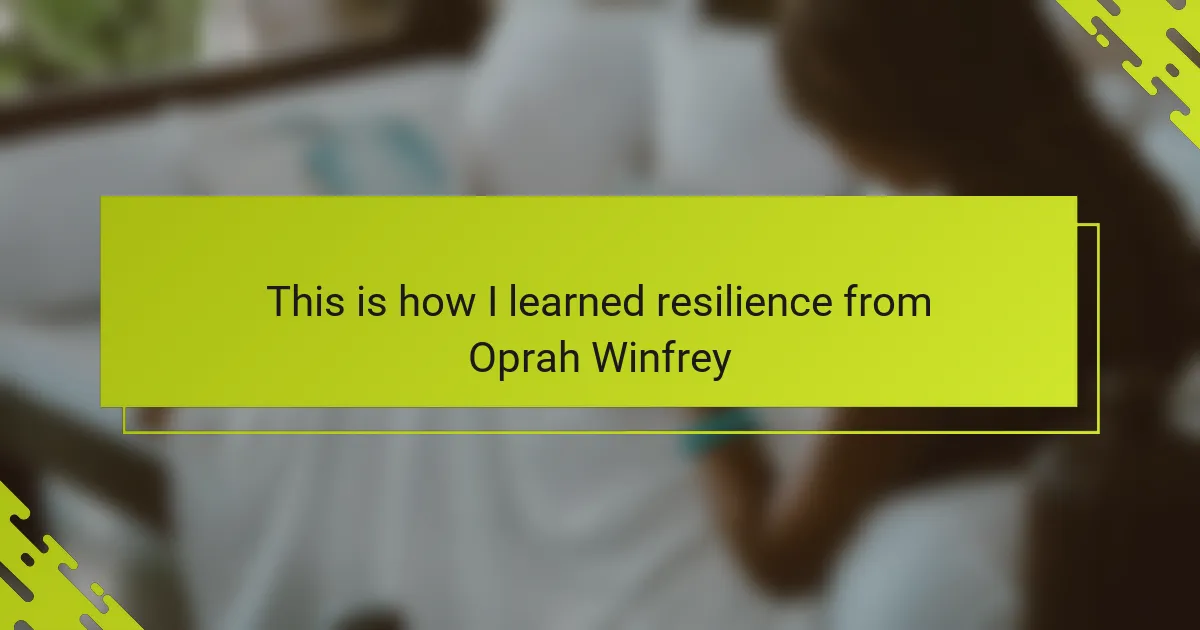Key takeaways
- Resilience in queer culture is rooted in authenticity and community, transforming hardships into sources of strength and empowerment.
- Key traits of resilience include adaptability, self-compassion, and the importance of connections with others.
- Oprah Winfrey exemplifies resilience by embracing vulnerability, encouraging others to share their struggles and find strength in community.
- Daily practices such as honoring emotions, setting boundaries, and self-care rituals are essential for building lasting resilience.
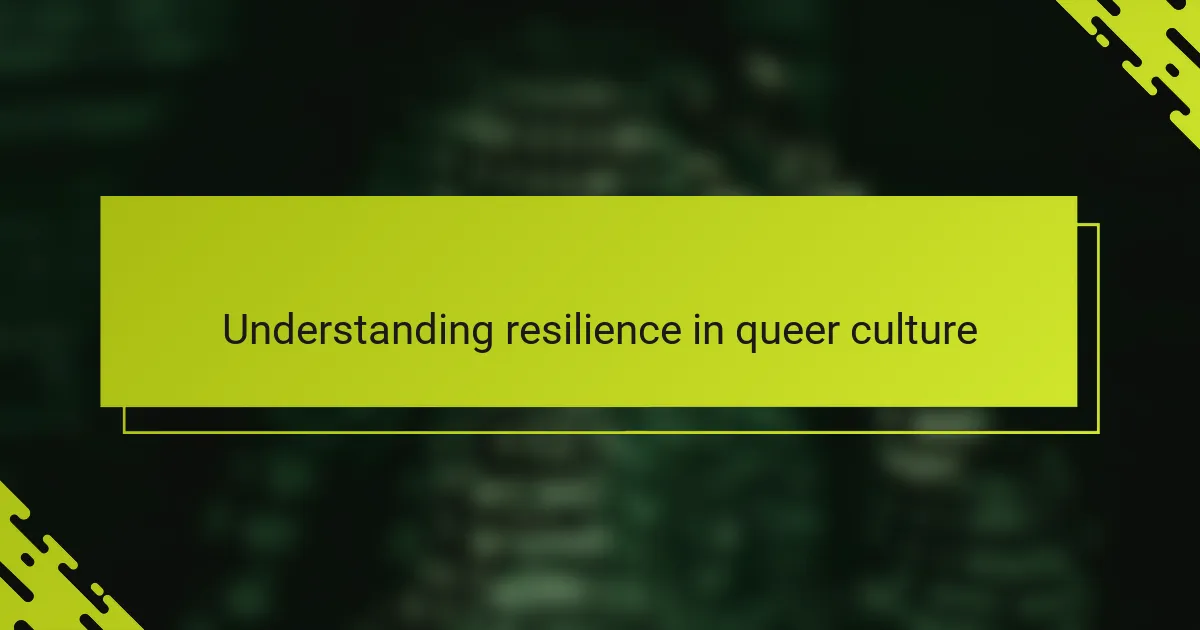
Understanding resilience in queer culture
Resilience in queer culture feels like a quiet strength born from a lifetime of navigating a world that often misunderstands or rejects you. I’ve seen how this toughness isn’t just about surviving hardship; it’s about thriving despite it, fueled by a deep sense of identity and community. Have you ever noticed how the small victories—a moment of acceptance, a genuine connection—can feel like an enormous triumph in this context?
What strikes me most is how resilience here is tied to authenticity. When you’re constantly asked to conform or hide parts of yourself, choosing to live openly becomes an act of courage that shapes who you are. I remember a time when embracing my truth wasn’t easy, but that choice planted the seeds of my own resilience, a feeling I carry with me every day.
I wonder, how would resilience change if queer culture was widely celebrated instead of marginalized? Maybe then it wouldn’t have to be a necessary defense mechanism but a proud expression of flourishing identity—a thought that both challenges and inspires me.
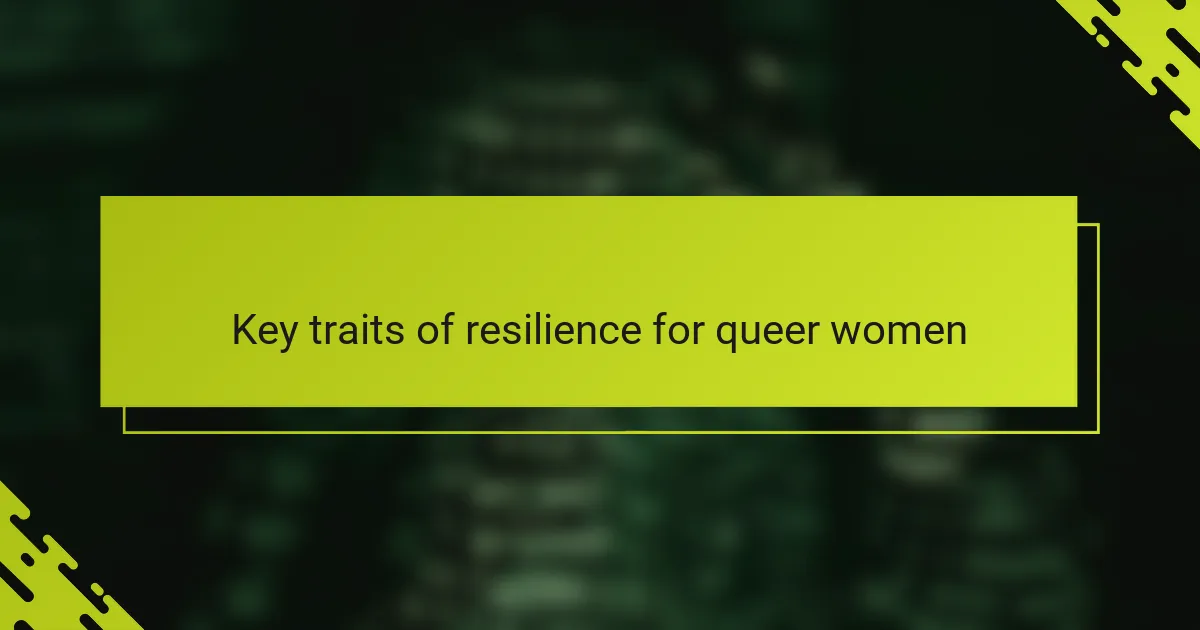
Key traits of resilience for queer women
One key trait I’ve noticed in resilient queer women is adaptability—the ability to shift and bend without breaking when faced with unexpected challenges. It’s like learning to dance in a storm; you might not control the weather, but you can control how you move through it. Hasn’t there been a moment when you had to rewrite your story on the fly just to keep your spirit intact?
Another trait that stands out is self-compassion. Growing up, I often felt pressured to push harder, be stronger, without showing any cracks. But I’ve learned that resilience isn’t just about enduring; it’s also about giving yourself grace. When I stopped being my own harshest critic, I found a quieter, more sustainable strength blossoming from within.
Lastly, I believe community plays an indispensable role in fostering resilience. There’s a profound sense of solidarity among queer women that transforms isolation into connection. I’ve experienced firsthand how sharing struggles and victories with others isn’t just comforting—it rekindles the courage to keep going. Isn’t it remarkable how knowing someone else truly understands can make all the difference?
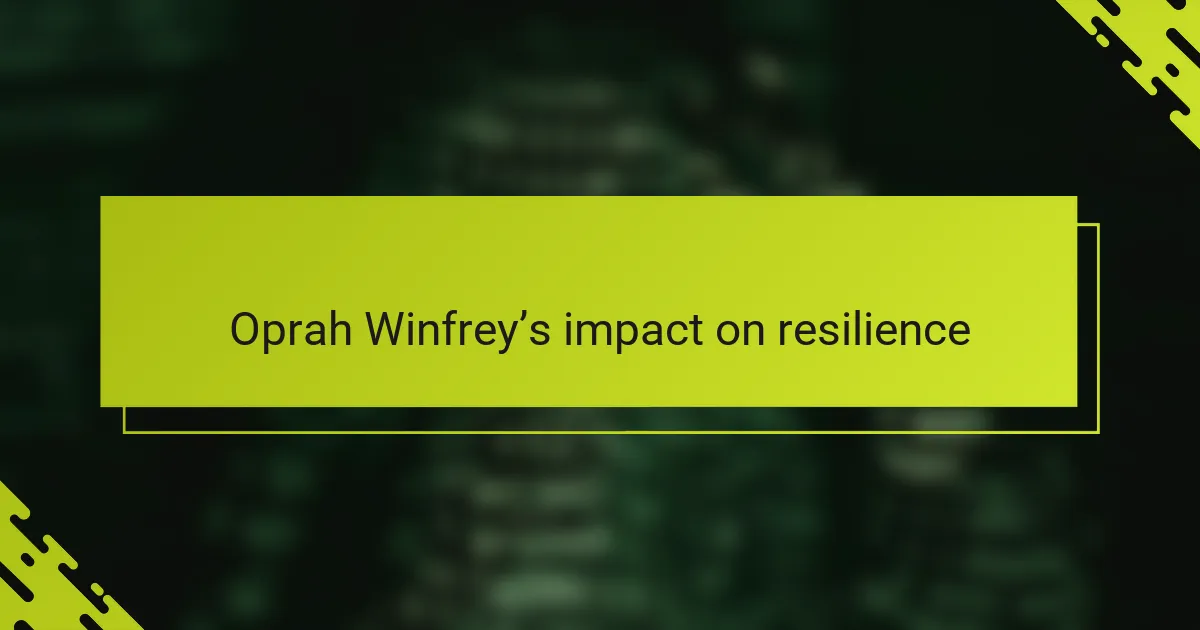
Oprah Winfrey’s impact on resilience
Oprah Winfrey’s journey is a powerful reminder that resilience is more than just bouncing back—it’s about rising with purpose. Watching her confront unimaginable hardships, I’ve often thought, how does someone transform pain into such unwavering strength? For me, Oprah’s story answers that question with grace and relentless determination.
Her ability to speak openly about vulnerability changed the way I see resilience. Rather than hiding our struggles, she shows that acknowledging them can be a source of power. Have you noticed how her honesty invites us to own our own stories, no matter how messy or painful they might be? It’s a lesson I keep close when I face moments of doubt.
What really strikes me is how Oprah’s impact goes beyond individual grit. She creates a space where healing and growth are possible together, reminding us that resilience isn’t a solo act. Isn’t that what we all crave—a community where our strength can multiply and inspire others? Oprah’s influence teaches me that resilience is contagious when shared.
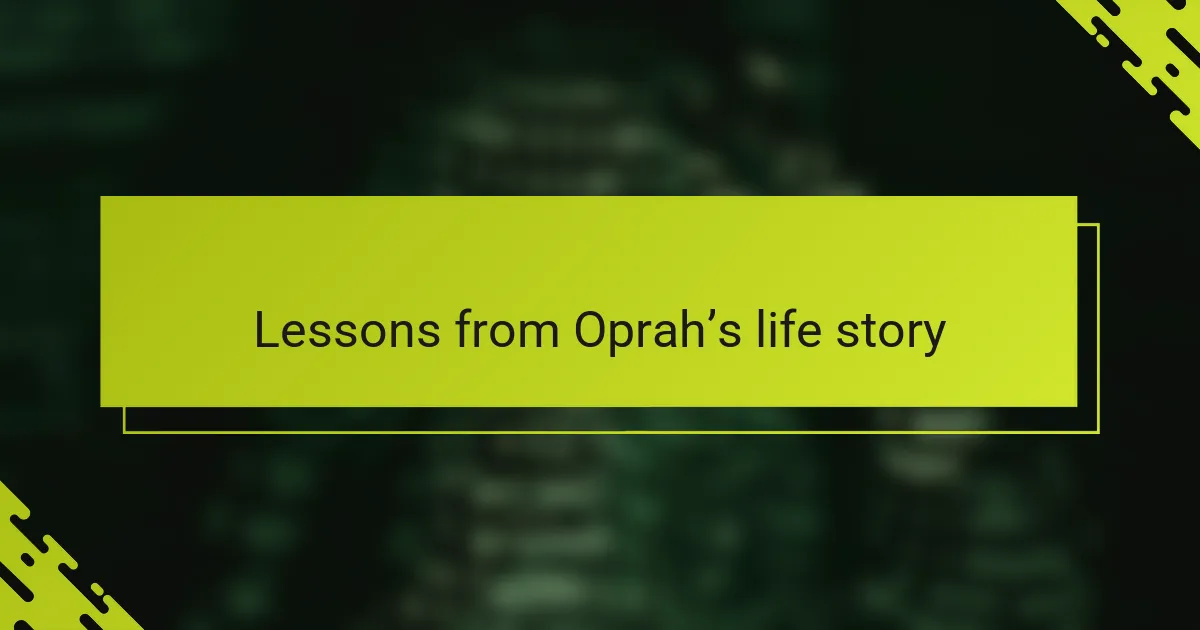
Lessons from Oprah’s life story
Oprah’s life story teaches us that resilience is deeply tied to embracing one’s own truth, even when the world pushes back hard. I’ve often thought about how her early struggles—poverty, abuse, and rejection—could have broken her, yet she chose to transform those wounds into a source of power. Doesn’t that make you wonder how much strength lies in facing your darkest moments head-on instead of hiding from them?
One thing I find most inspiring is Oprah’s refusal to let her past define her future. She shows us that resilience isn’t just surviving but owning your story fully and using it as a foundation for something greater. I remember times when I felt stuck because of my own history, yet her example reminded me: growth often begins with acceptance, not denial.
Finally, Oprah’s journey highlights the importance of community in resilience. Through her work, she creates connections, reminding me that resilience thrives when we uplift each other rather than going it alone. Have you ever felt the shift that happens when your struggles become shared stories? That collective energy can turn pain into purpose—and that’s a lesson I carry with me every day.
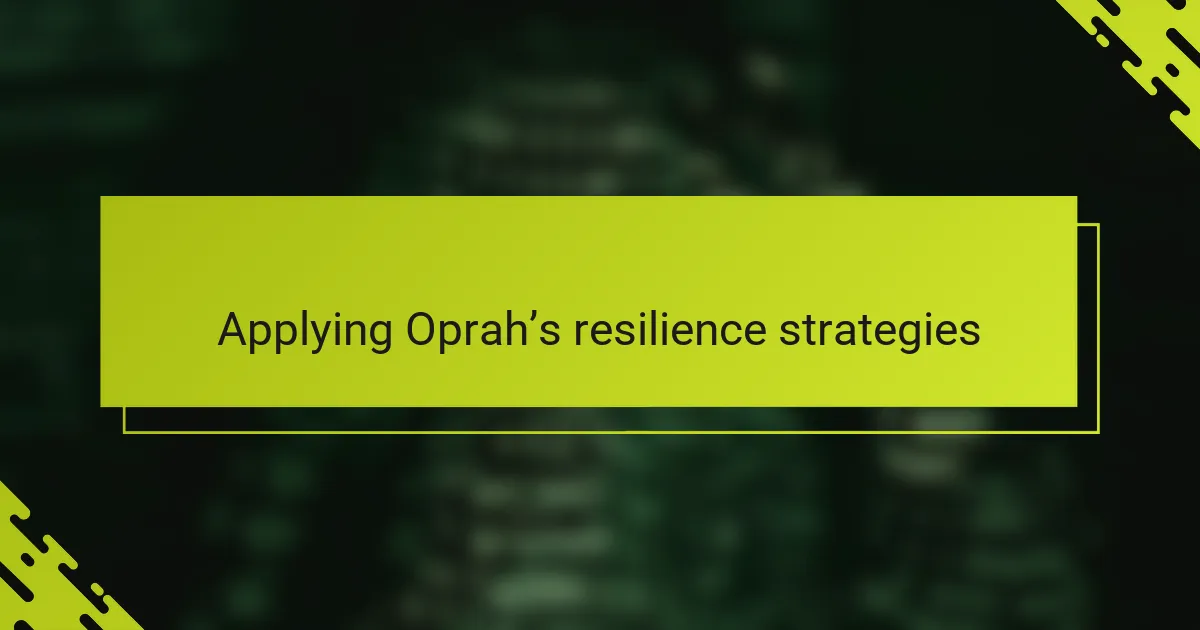
Applying Oprah’s resilience strategies
Applying Oprah’s resilience strategies means embracing vulnerability as a source of strength. I remember a time when I hesitated to share my struggles, fearing judgment, until Oprah’s openness encouraged me to speak my truth—and that shift changed how I faced challenges.
Another key practice I’ve adopted is transforming pain into purpose, just as Oprah did. When life felt overwhelming, I asked myself: how can this hardship fuel my growth instead of breaking me? That mindset helped me turn setbacks into stepping stones, creating a resilience that feels alive, not just reactive.
Finally, I find myself leaning into community the way Oprah models—building spaces where courage is shared and multiplied. Have you noticed how resilience deepens when we connect authentically? For me, these connections turn isolation into collective power, making every struggle a little lighter.
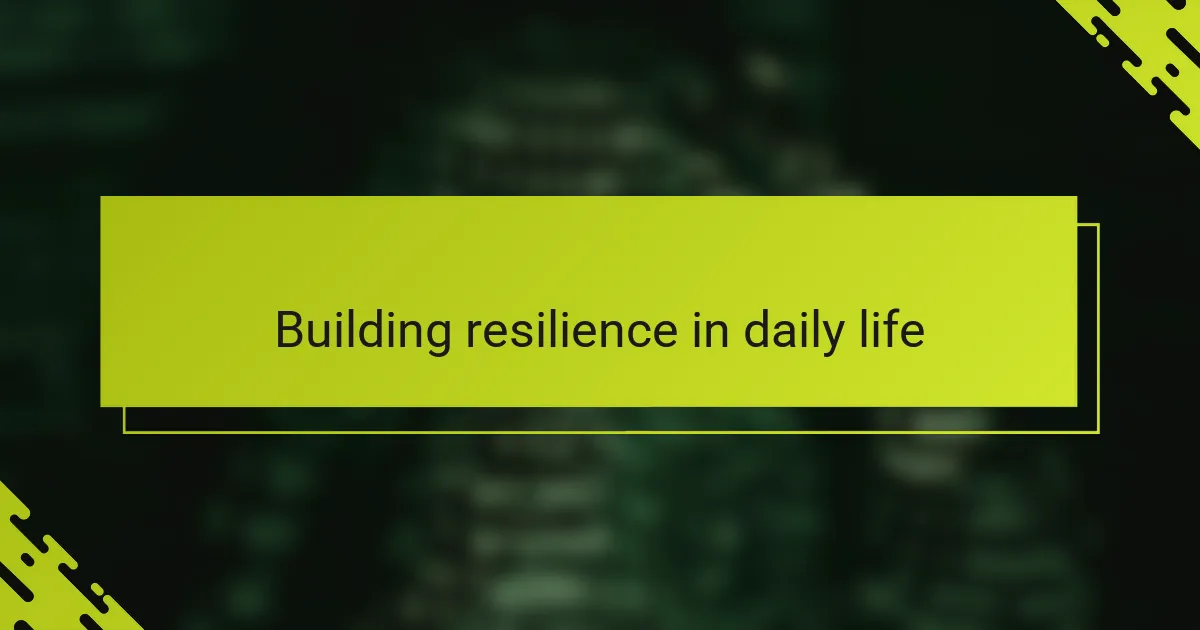
Building resilience in daily life
Building resilience in daily life often starts with the small, deliberate choices we make each day to face discomfort head-on rather than avoid it. I’ve found that even something as simple as setting a boundary or speaking up for myself can feel like a quiet act of resistance that strengthens my inner core. Have you ever noticed how these tiny moments accumulate, slowly building a foundation that holds firm when bigger storms arrive?
There’s also the practice of pausing to acknowledge our emotions without judgment—a strategy that feels surprisingly powerful. Early on, I used to push aside feelings of fear or doubt, thinking resilience meant never showing weakness. But what Oprah taught me is that truly being resilient includes honoring those emotions as signals, not failures. When I started doing this, I found I could respond more thoughtfully and bounce back more fully.
Daily resilience, I believe, is deeply tied to the rhythms of self-care—those moments where we reconnect with what grounds us, whether it’s a walk, a deep breath, or reaching out to someone who sees us. I’ve noticed that when I let these practices slip, my resilience diminishes like a flickering flame. How do you nourish your spirit day-to-day to keep that fire burning strong? For me, it’s those small rituals that make resilience feel less like a distant ideal and more like an everyday reality.
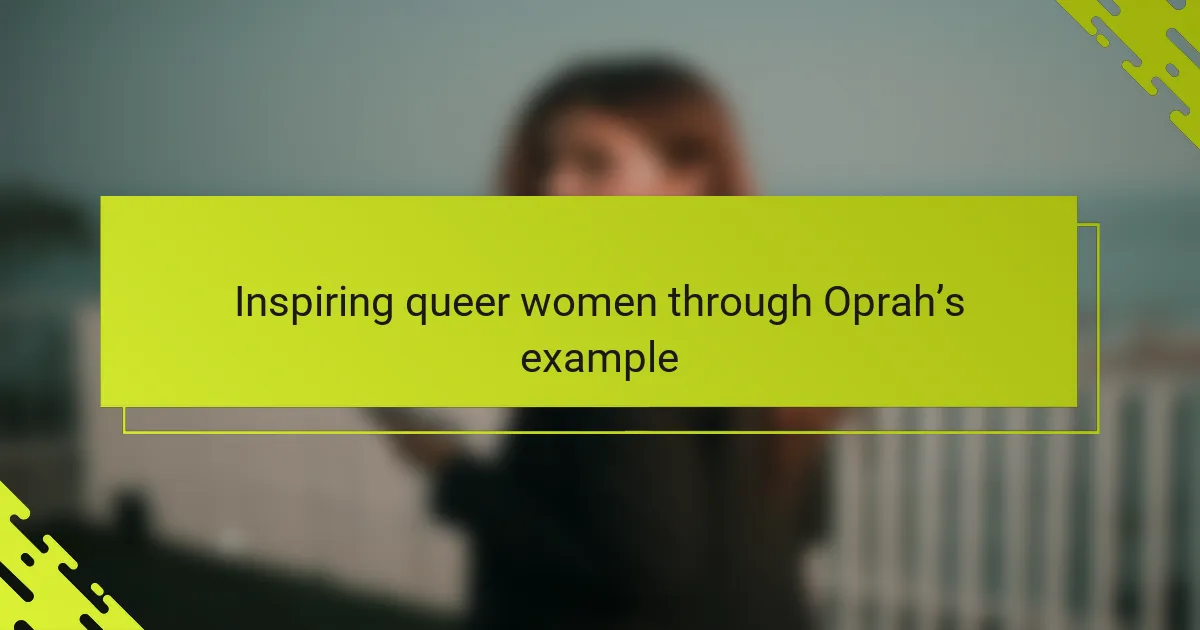
Inspiring queer women through Oprah’s example
Oprah’s example has felt like a beacon for many queer women, including myself. Her courage in embracing vulnerability not only breaks down walls but also lights a path for us to live our truths boldly. Have you ever noticed how witnessing her authenticity makes it easier to trust your own story, even when it feels messy or complicated?
What I find most inspiring is how Oprah doesn’t just survive adversity—she transforms it into a force that uplifts others. This ripple effect resonates deeply within queer communities, where shared strength often becomes a catalyst for collective empowerment. I remember feeling less alone after realizing that resilience isn’t just about individual triumph; it’s about building each other up, just like Oprah models.
Oprah’s ability to create spaces for honest conversation reminds me that resilience thrives through connection. When I’ve struggled, thinking of her example helped me seek out community rather than retreat. It’s in these shared moments of openness that resilience grows stronger, becoming less of a solitary battle and more of a shared journey. Have you experienced how this dynamic transforms challenges into opportunities for growth?
